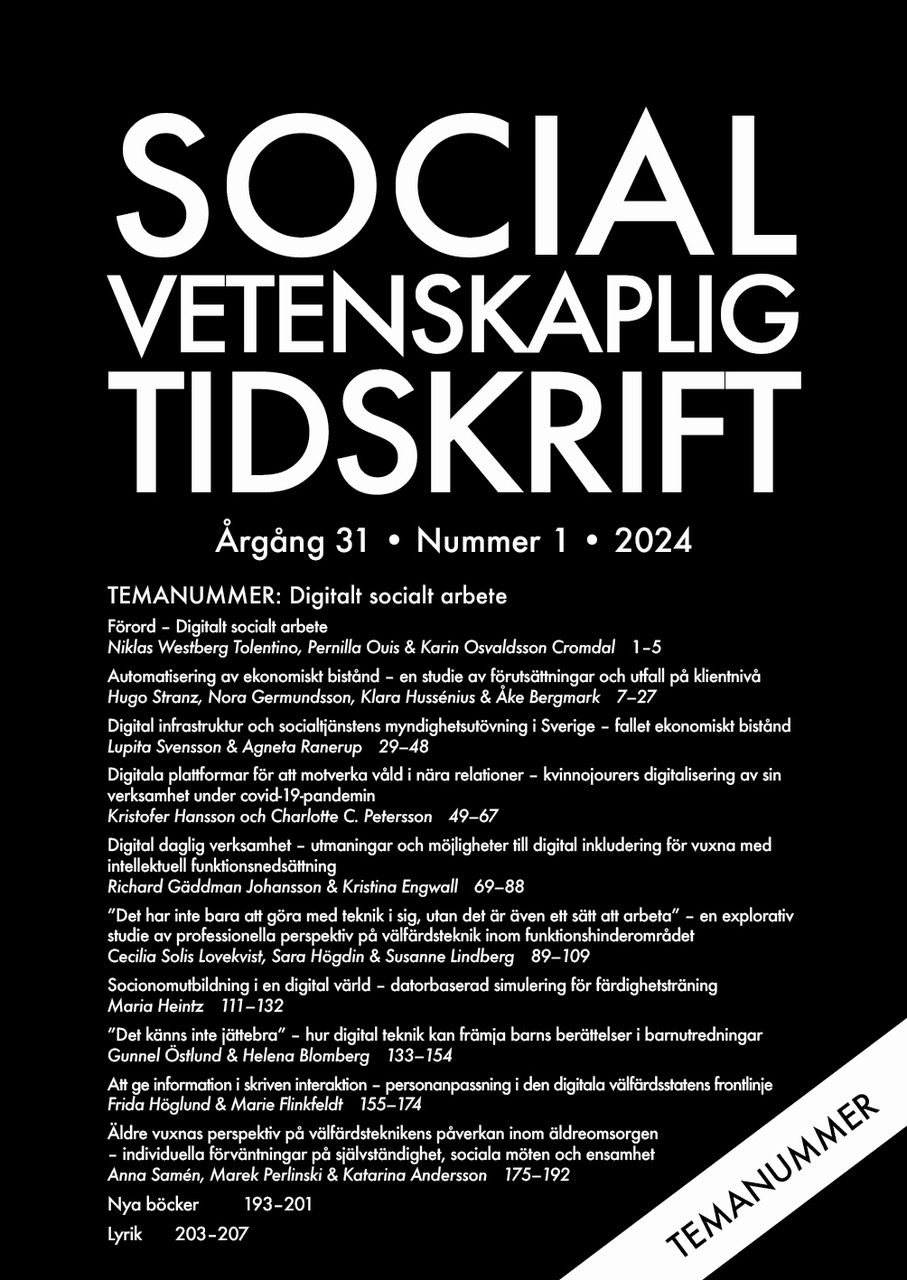Digital daglig verksamhet
– utmaningar och möjligheter till digital inkludering för vuxna med intellektuell funktionsnedsättning
DOI:
https://doi.org/10.3384/SVT.2024.31.1.4871Nyckelord:
digital divide, intellectual disability, information and communication technology, day centre, COVID-19 pandemicAbstract
Digital daily activities – challenges and opportunities for the digital inclusion of adults with intellectual disability
This article analyses challenges and opportunities related to the digitisation of daily activities for adults with intellectual disability (ID) using information and communication technology (ICT). An overarching question is whether these experiences can promote digital inclusion for people with ID, in accordance with the Convention on the Rights of Persons with Disabilities. The article draws on interviews with 16 service users, nine support persons and 19 staff and managers at five day centres, all of which used digital activities during the COVID-19 pandemic. The interviews were analysed using theoretical thematic analysis informed by van Dijk’s (2012) arguments on the diffusion, acceptance, and adoption of new technologies to achieve digital inclusion. During the spring of 2020, many day centres closed due to COVID-19. The introduction of digital activities revealed a lack of access to ICT. Bureaucratic barriers were encountered, such as uncertainty about secure digital platforms and GDPR. Additionally, ICT use could be challenging due to rapid developments, as well as ubiquitous demands for the innovation and improvement of provided activities. Another obstacle was a lack of digital skills and scepticism towards digital activities among staff at the day centres and support persons in the service users’ home environments, which sometimes led to the denial of services. Yet, cooperative ICT usage among staff and support persons was perceived to promote a more holistic approach to service provision. When adequately supported, ICT usage allowed opportunities for personal development and improved self-esteem in persons with ID, as well as individually tailored service provision. The experiences of using ICT during the pandemic increased the day centres’ abilities to overcome physical distance in offering meaningful activities for service users. However, disparities persist, warranting further efforts towards reducing the digital divide affecting people with ID.
Downloads
Publicerad
Referera så här
Nummer
Sektion
Licens
Copyright (c) 2024 Richard Gäddman Johansson, Kristina Engwall

Det här verket är licensierat under en Creative Commons Erkännande 4.0 Internationell-licens.
Allt material i Socialvetenskaplig tidskrift publiceras sedan 2022 (Vol 28 Nr 2) med omedelbar öppen tillgång (open access), under Creative Commons-licensen CC BY 4.0. Upphovsrätten till innehållet tillhör respektive författare.
Allt innehåll i tidskriften är fritt tillgängligt utan kostnad och får fritt läsas, laddas ned, kopieras, delas, skrivas ut och länkas. När innehållet används måste författare, källa och licens anges. Författaren kan fritt göra sin publicerade text tillgänglig på institutionella och internetbaserade arkiv, exempelvis sitt lärosätes digitala arkiv eller andra tjänster för detta.
Inga publiceringsavgifter tas ut vid publicering i Socialvetenskaplig tidskrift.


